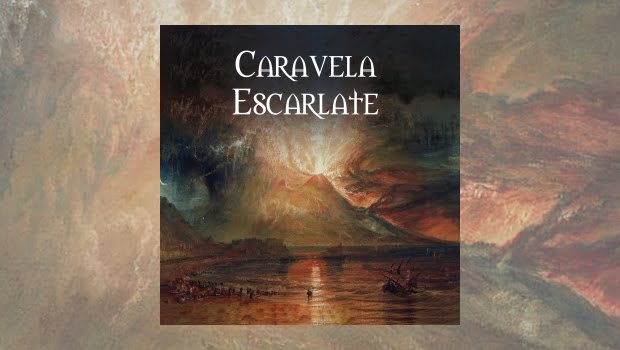Formed in Rio de Janeiro in 2011, Caravela Escalarte is firmly rooted in classic seventies prog. Comprised of bassist/vocalist David Paiva, keyboardist Ronaldo Rodrigues and drummer Elcio Cafaro, the band is a delightful trip back to the days of keyboard-driven heavy prog. If you are looking for ground-breaking originality, look elsewhere. This is musical comfort food, created to satisfy that deep hunger for a glorious time when Hammonds and synths ruled the landscape and four on the floor beats were crushed into oblivion.
This third album by the trio is a game of spot the influence. Even so, the performances are so passionate and the compositions so skilled that you should not let that stand in the way of a rollicking good time. The band’s love for their forebears shines through on every track and transcends imitation to become the sincerest form of flattery.
Paiva’s vocals, in my opinion, are what set this band apart. His voice is unlike any one singer in the genre; rather, it has a sense of familiarity that is reassuring and welcome. His tone is more angelic than harsh, but there is a resonance that favourably brings to mind comparisons with the late Helmut Kollen more so than the Jon Anderson school of vocalising.
Bussola do Tempo (Time Compass) begins the album with a joyous ELP-styled romp. From the very beginning, it is obvious that the organ will crush anything that stands in its way. Still, Rodrigues leaves plenty of room for the rest of his keyboard arsenal, allowing the synths to take over the soloing. Not to be outdone, drummer Elcio Cafaro never settles into a simple beat, riding an aggressive, almost martial drum pattern to the finish line.
While we wait to see if any new music will arrive from Camel, Castelos do Céu (Castle of the Ceu) is a worthy enough tune to hold us over. The keyboard sounds are vintage Peter Bardens. The heavy echo on the vocal is an incredibly fitting accompaniment to the retro vibe of the song and the reliance on repetitive, stick-with-you melodies almost makes one wonder if these guys are vying for radio play. However, there are enough twists and turns in the underlying instrumental attack that will quickly disabuse the listener of any such notion. Some beautiful piano fills provide a relief from the massive wall of organ and synths that dominate this and other tracks.
The album’s ten-minute epic, Cruz de Ordem (Order of the Cross) opens with a gorgeous, mournful Mellotron and synth before the mighty Rickenbacker and the drums join with the Hammond to change both the tempo and the tenor of the song. Each song on the album reflects a piece of ancient history, and this one brings to mind the Crusades with its evocation of aggression juxtaposing with the quieter sounds, almost like prayer before entering the battle. When the vocals finally arrive four minutes in, they feel for all the world like an apology for the carnage that has gone before. The interplay between the jarring and the sorrowful makes this one of the standout tracks on III. Sounding remarkably like Magician’s Birthday-era Uriah Heep, what sounds like a theremin closes out the song, leading to a final, triumphant major chord.
The finest melody and vocal performance on the album belong to the shortest song, Ciclos (Cycles), at three-and-a-half minutes. The busy drums seem to be trying to push the keyboards to the side, but the use of varying synth textures keeps the keys ever to the fore.
A couple instrumental tracks, Mandala and Fitros dos Sonhos (Dream Filers), are fine showcases for the prowess of these musicians and two of my favourite tracks on the album. Mandala features a great percussive synth lead, sounding almost like a clavinet. Again, drummer Elcio Cafaro appears determined not to play a simple beat, but never crosses the line into showing off for the sake of his own “Hey ma, look what I can do” moment. It’s the Mellotron strings midway through that generate a needed sense of lightness before the coda takes things out on a decidedly unexpected path. That clavinet sound returns to close out the album on the final song, Fitros dos Sonhos. The bass finally get a chance to shine, but like his compatriots, Paiva chooses to serve the song rather than grandstand. Joined quickly by piano and drums, the trio builds up a head of steam before the organ returns to assert its dominance, only to continually shift pacing and approach again and again. Like a dream, the disparate sections can seem confusing at first. However, repeated listens show how it all manages to hang together as a single piece.
Named for a Portuguese sailing vessel of the 15th to 17th Centuries, Caravela Escalarte (Scarlet Caravel) looks back to a time when the world was different and ruled by a class of prodigiously talented musicians and writers. While they may not be the most original band you will hear this year, they will certainly satisfy that nostalgic longing for the music of those seventies giants who have largely disappeared, either into that rock and roll heaven or up their own arses. A fun ride which I look forward to taking again.
TRACK LISTING
01. Bússola do Tempo (5:13)
02. Castelos do Céu (7:15)
03. Sonhos Medievais (7:57)
04. Mandala (4:47)
05. Cruz da Ordem (10:16)
06. Ciclos (3:34)
07. Fitros dos Sonhos (7:11)
Total Time – 46:13
MUSICIANS
David Paiva – Bass, Vocals
Ronaldo Rodrigues – Keyboards
Elcio Cafaro – Drums, Percussion
ADDITIONAL INFO
Record Label: Karisma Records
Country of Origin: Brazil
Date of Release: 27th January 2023

